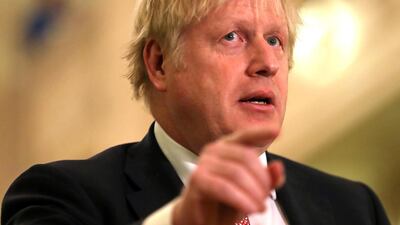UK Prime Minister Boris Johnson has called on US President Donald Trump to replace the Iran nuclear deal with a new agreement so that Tehran does not develop atomic weapons.
European nations have said they still support the JCPOA, which was brokered in 2015, despite Iran announcing it would abandon limitations on enriching uranium.
"If we're going to get rid of it, let's replace it and let's replace it with the Trump deal," Mr Johnson said. "That would be a great way forward."
"If you get rid of this nuclear deal, the JCPOA, it's what Trump wants. My point to our American friends is, look, somehow or other, we've got to stop the Iranians acquiring a nuclear weapon," he added.
Mr Trump pulled the US out of the JCPOA in 2018, branding it "the worst deal ever negotiated".
The US President said he wished to do a new deal with Iran following the recent escalation of tensions over the killing of Iranian General Qassem Suleimani.
The British prime minister called for calm in the 30-minute televised interview with Britain's national broadcaster.
"I don't want a military conflict between us, the United States and Iran, let's dial this thing down," he said.
Mr Johnson was criticised by some sections of the British press for not giving an official response immediately after the Iranian general’s death on January 2. He admitted he was on holiday and had not been informed by the US of the operation.
The assassination has sparked fears for British-Iranian dual nationals currently in prison in Iran. The husband of Nazanin Zaghari-Ratcliffe said he believes it is unlikely his wife will be released from prison, even after serving her five-year sentence in 2021.
When pressed, the prime minister said it was “hard to say" whether Suleimani’s death would make Ms Zaghari-Ratcliffe’s or other jailed dual nationals more or less difficult.
On the Ukrainian airliner crash last week that killed 176 people, Mr Johnson said it was good that Iran had apologised for mistakenly shooting down the plane.
"They're clearly guilty of an appalling error," he said. "I don't think we are currently envisaging any further escalation of the tensions."
The downing of the aircraft caused three days of protests in Tehran.
The UK's ambassador to Iran was briefly detained on Saturday after attending a vigil for the victims, who were mainly Iranian and Iranian-Canadian.


